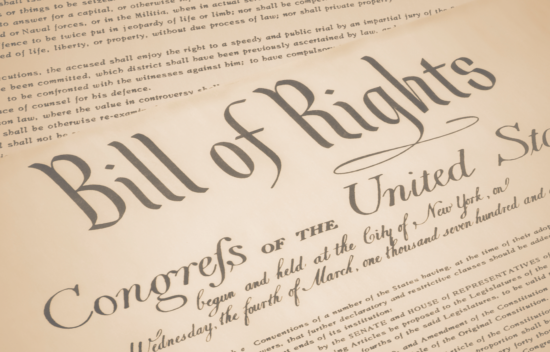Handout A: War and the Constitution (V1)
War and the Constitution
Directions: Read carefully the following sections of Article I, Sections 8 and 9, and Article II, Section 2. Using your copy of the Bill of Rights, carefully examine the First, Fourth, Fifth, and Sixth Amendments. Then answer the questions that follow.
ARTICLE I, SECTION 8 (1789)
The Congress shall have power…
To declare war, grant letters of marque and reprisal, and make rules concerning captures on land and water;
To raise and support armies, but no appropriation of money to that use shall be for a longer term than two years;
To provide and maintain a navy;
To make rules for the government and regulation of the land and naval forces;
To provide for calling forth the militia to execute the laws of the union, suppress insurrections and repel invasions;
To provide for organizing, arming, and disciplining, the militia, and for governing such part of them as may be employed in the service of the United States, reserving to the states respectively, the appointment of the officers, and the authority of training the militia according to the discipline prescribed by Congress…
To make all laws which shall be necessary and proper for carrying into execution the foregoing powers…
ARTICLE I, SECTION 9 (1789)
The privilege of the writ of habeas corpus shall not be suspended, unless when in cases of rebellion or invasion the public safety may require it.
ARTICLE II, SECTION 2 (1789)
The President shall be commander in chief of the Army and Navy of the United States, and of the militia of the several states, when called into the actual service of the United States; he may require the opinion, in writing, of the principal officer in each of the executive departments, upon any subject relating to the duties of their respective offices, and he shall have power to grant reprieves and pardons for offenses against the United States, except in cases of impeachment.
He shall have power, by and with the advice and consent of the Senate, to make treaties, provided two thirds of the Senators present concur…
CRITICAL THINKING QUESTIONS
- What would be a good title for Article I, Section 8? Article I, Section 9?
- In your judgment, which branch of government has greater war powers, the legislative or executive? Use the Constitution to support your answer.
- Does the President’s authority as Commander in Chief apply anywhere other than in military situations?
- Read the First, Fourth, Fifth, and Sixth Amendments. Does the President’s authority as Commander in Chief empower him to act in ways that may violate individuals’ rights, such as those protected by the Bill of Rights? If so, under what circumstances?


